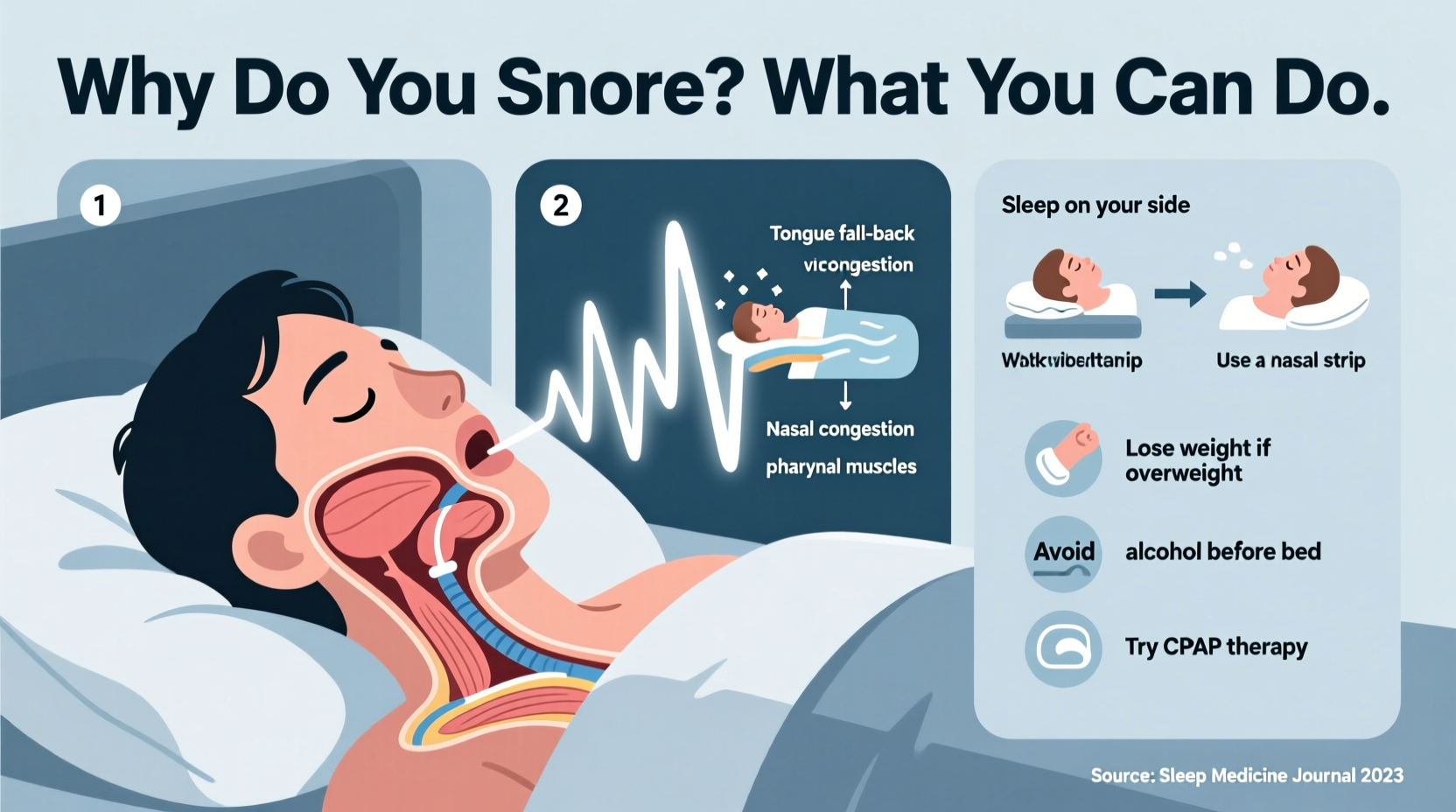Snoring is commonly thought of as something others notice—something that disrupts a partner’s sleep while the snorer remains blissfully unaware. But what if you’re the one hearing yourself snore? That moment when you drift off and suddenly become conscious of a loud rumble coming from your own throat can be startling, even unsettling. It raises questions: Is this normal? Does it mean something’s wrong? And most importantly, what can you do about it?
Hearing yourself snore isn’t as rare as you might think. While many people only learn they snore from a partner or roommate, some are light sleepers or partially awaken during episodes, making them aware of their own sounds. Understanding why this happens—and how to address the root causes—is essential for better sleep quality and long-term health.
The Science Behind Snoring

Snoring occurs when airflow through the mouth and nose is partially obstructed during sleep. As air squeezes through narrowed passages, soft tissues like the uvula, soft palate, and base of the tongue vibrate, creating the familiar rattling or rumbling sound.
This obstruction can stem from several factors:
- Anatomical features such as a deviated septum, enlarged tonsils, or a low, thick soft palate
- Relaxed throat muscles due to sleep stage (especially REM)
- Nasal congestion from allergies or colds
- Alcohol consumption before bed, which increases muscle relaxation
- Being overweight, which adds fatty tissue around the upper airway
When you \"hear yourself snore,\" you're likely experiencing micro-awakenings—brief interruptions in your sleep cycle caused by the effort of breathing against resistance. These arousals may not fully wake you, but they’re enough to register the sound of your snoring just before drifting back to sleep.
“Snoring with self-awareness often indicates fragmented sleep architecture. Even if you don’t remember waking up, your brain is registering respiratory effort.” — Dr. Lena Torres, Sleep Neurologist, Cleveland Clinic
Why You Might Be Hearing Your Own Snoring
Most snorers are unaware of their noise because deep sleep suppresses sensory awareness. However, certain conditions make self-perception more likely:
Light or Fragmented Sleep
If you're a naturally light sleeper or suffer from insomnia, sleep apnea, or frequent nighttime awakenings, you’re more prone to catching snippets of your own snoring. Each time your airway partially collapses, your brain may briefly stir to restore normal breathing, creating a moment of auditory consciousness.
Positional Awareness
Sleeping on your back increases the likelihood of airway collapse due to gravity pulling soft tissues downward. In this position, snoring tends to be louder and more consistent, increasing the chance you’ll hear it—especially if you shift positions and trigger a brief arousal.
Environmental Factors
A quiet bedroom amplifies internal sounds. Without background noise to mask it, the vibrations from your throat can echo inside your skull, making them seem louder to you than to someone across the room.
Health Implications of Self-Aware Snoring
Occasional snoring with self-awareness isn’t necessarily dangerous. But if it happens nightly and is accompanied by gasping, choking, or daytime fatigue, it could signal obstructive sleep apnea (OSA)—a condition where breathing repeatedly stops and starts during sleep.
Untreated OSA increases the risk of:
- High blood pressure
- Heart disease and stroke
- Type 2 diabetes
- Poor cognitive performance and memory issues
Self-heard snoring becomes a red flag when combined with other symptoms:
| Symptom | May Indicate | Action Step |
|---|---|---|
| Frequent awakenings with gasping | Sleep apnea | Consult a sleep specialist |
| Excessive daytime sleepiness | Poor sleep quality or OSA | Track sleep patterns; consider a sleep study |
| Morning headaches | Oxygen fluctuations at night | Evaluate breathing during sleep |
| Loud, chronic snoring | Structural airway issue | Explore lifestyle or medical interventions |
What You Can Do: Practical Solutions
The good news is that most cases of snoring—and the self-awareness that comes with it—can be improved with targeted changes. Here’s a step-by-step guide to reducing or eliminating snoring:
Step 1: Adjust Your Sleep Position
Sleeping on your back encourages airway collapse. Train yourself to sleep on your side using positional therapy techniques:
- Use a body pillow to maintain side alignment
- Try a wearable device that vibrates when you roll onto your back
- Place a tennis ball in a pocket sewn into the back of your pajamas (a classic but effective trick)
Step 2: Optimize Nasal Breathing
Congestion forces mouth breathing, which increases snoring. Improve nasal airflow with:
- Nasal strips or dilators
- Saline sprays before bed
- Treating underlying allergies with antihistamines or nasal corticosteroids (under doctor supervision)
Step 3: Limit Alcohol and Sedatives
These substances relax throat muscles excessively. Avoid drinking alcohol at least 3–4 hours before bedtime.
Step 4: Maintain a Healthy Weight
Excess weight, especially around the neck, compresses the airway. Losing even 5–10% of body weight can significantly reduce snoring frequency and intensity.
Step 5: Consider Medical Devices
If lifestyle changes aren’t enough, talk to your doctor about:
- Oral appliances that reposition the jaw and tongue
- CPAP (Continuous Positive Airway Pressure) machines for diagnosed sleep apnea
- Surgical options for structural issues (e.g., deviated septum repair)
Checklist: Reduce Snoring in 7 Days
- Day 1: Switch to side sleeping using a pillow or positional aid
- Day 2: Eliminate alcohol consumption within 4 hours of bedtime
- Day 3: Use a nasal strip or saline spray before sleep
- Day 4: Set up white noise in the bedroom to improve sleep continuity
- Day 5: Weigh yourself and set a modest weight loss goal (if applicable)
- Day 6: Track your sleep and snoring with a recording app
- Day 7: Schedule a consultation with a sleep specialist if symptoms persist
Real Example: Mark’s Journey to Quieter Nights
Mark, a 42-year-old software developer, began noticing he could hear himself snoring every few nights. At first, he dismissed it—until his wife mentioned he was waking her multiple times per hour. He started feeling fatigued during the day, struggling to focus at work.
After tracking his sleep with a smartphone app, he discovered he snored loudly nearly every night and experienced over 20 breathing interruptions per hour. A sleep study confirmed mild obstructive sleep apnea.
His doctor recommended a mandibular advancement device. Within two weeks, Mark’s snoring decreased dramatically. His wife reported fewer disturbances, and Mark no longer heard himself snore. More importantly, his energy levels returned to normal.
FAQ
Can you really hear yourself snore?
Yes—especially if you experience micro-awakenings due to breathing effort or sleep fragmentation. While most snorers are unaware, light sleepers or those with sleep-disordered breathing often become conscious of their snoring.
Is hearing myself snore a sign of sleep apnea?
Not always, but it can be. If your self-aware snoring is accompanied by gasping, choking, daytime fatigue, or observed breathing pauses, consult a healthcare provider. A sleep study can confirm or rule out sleep apnea.
Are there apps that can detect snoring?
Yes. Apps like Sleep Cycle, SnoreLab, and Pillow use your phone’s microphone to record and analyze nighttime sounds. They provide feedback on snoring frequency and duration, helping you track progress over time.
Take Control of Your Sleep
Hearing yourself snore doesn’t have to be a nightly occurrence. It’s a signal—one that your body uses to alert you to potential disruptions in breathing and sleep quality. By understanding the causes and taking proactive steps, you can reduce or eliminate snoring, improve your rest, and protect your long-term health.
Start tonight: change your sleep position, clear your nasal passages, and create a quieter sleep environment. Small adjustments often yield significant results. If problems persist, don’t hesitate to seek professional evaluation. Better sleep isn’t just about silence—it’s about restoring balance to your body’s most essential function.









 浙公网安备
33010002000092号
浙公网安备
33010002000092号 浙B2-20120091-4
浙B2-20120091-4
Comments
No comments yet. Why don't you start the discussion?